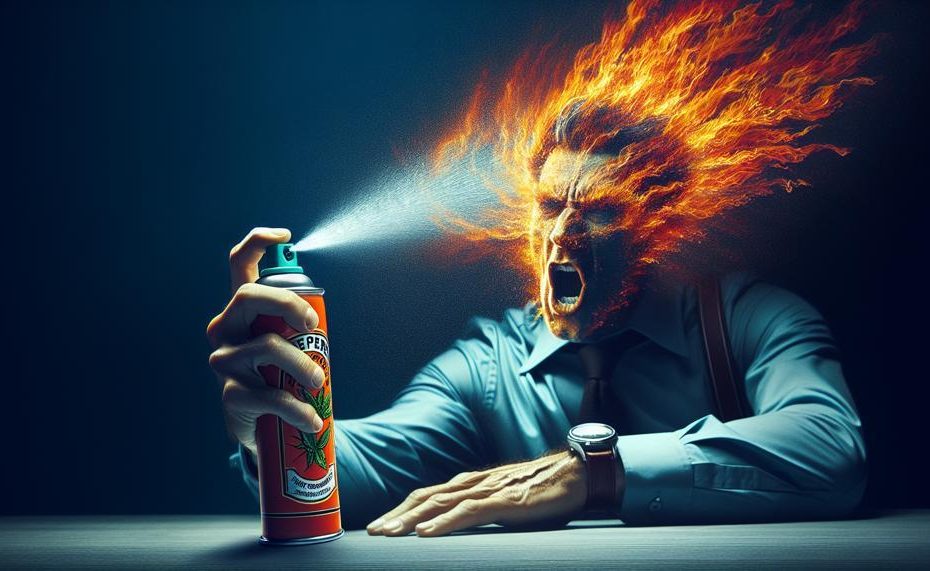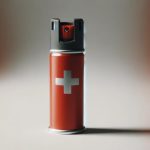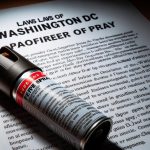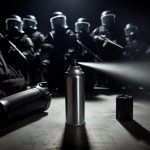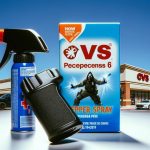Have you ever been curious about the sensation of being sprayed with pepper spray?
Also known as OC spray, this popular self-defense tool is notorious for causing intense pain and discomfort.
In this blog post, we will delve into the world of pepper spray and explore its effects on the body.
We will provide a detailed description of what it feels like to encounter this potent irritant. From searing eyes to constricted breathing.
Whether you’re considering buying pepper spray or have already felt its effects, our post will provide valuable insights and information.
We’ll also discuss the different types of pepper spray available and their varying levels of potency.
So, keep reading to discover more about the unique sensation of pepper spray and how to protect yourself from its powerful effects.
Contents
What Does Pepper Spray Feel Like?
When encountering pepper spray, individuals usually endure a strong burning sensation, sharp stinging, and excruciating pain in their eyes, skin, and respiratory system.
This is caused by the active ingredient capsaicin, which triggers the nerve endings in the body.
The physical effects can linger for up to 45 minutes, accompanied by tearing, eye inflammation, difficulty in breathing, and disorientation. Additionally, individuals may also experience psychological effects like panic. They may also feel empowered.
Seeking immediate medical attention after exposure can mitigate any potential long-term complications.
| Immediate Physical Effects | Duration | Long-term Complications |
| – A combination of intense burning, stinging, and pain on the skin and respiratory system. | – Lasts for approximately 30-45 minutes. | – Eye injuries (from mild irritation to temporary blindness). |
| – Tearing and eye inflammation. | – Lasts for several minutes. | – Skin irritation (redness, swelling, itching, or a burning sensation). |
| – Difficulty in breathing and sensation of choking. | – May persist for up to 30 minutes. | – Allergic reactions (rare but possible in individuals with hypersensitivity). |
| – Disorientation. |
Understanding the Composition of Pepper Spray
Pepper spray is a complex mixture of various substances. The main active component is capsaicin, which is extracted from fiery chili peppers.
Additional ingredients may include water, alcohol, and propylene glycol as solvents. There may also be inert substances for stability and effectiveness.
When sprayed onto an assailant, the capsaicin in pepper spray binds to pain receptors on the skin and mucous membranes, causing an intense sensation of burning and stinging.
It also induces a reflex response in the body. This results in uncontrollable coughing and breathing difficulties. The heat and pressure of the spray’s dispersal mechanism can further intensify these effects.
Understanding the composition of pepper spray sheds light on how this self-defense tool works. It emphasizes its importance in protecting ourselves from potential attackers.
The Immediate Sensation: Burning on the Skin
Pepper spray is a self-defense tool derived from chili peppers. It contains capsaicin, which causes a burning sensation on the skin.
When sprayed, capsaicin binds to pain receptors. It triggers an inflammatory response, resulting in a burning sensation.
This chemical reaction makes pepper spray a potent tool for self-protection. Let’s explore how this process works in more detail.
| Step 1: | The spray makes contact with the skin. |
| Step 2: | The capsaicin in the spray binds to pain receptors on the skin. |
| Step 3: | The pain receptors send signals to the brain, causing it to register a burning sensation. |
| Step 4: | The body responds by releasing chemicals that cause inflammation. |
| Step 5: | This inflammation leads to swelling and increased blood flow to the affected area, resulting in further discomfort and pain. |
This process happens rapidly. It results in an immediate burning sensation that can last for several minutes or even longer. The duration depends on the strength and amount of pepper spray used.
The intensity of the burning sensation can vary based on an individual’s pain tolerance and sensitivity to capsaicin.
Effects on the Eyes and Respiratory System
Pepper spray is a powerful substance that can have significant and dangerous effects on the eyes and respiratory system.
This self-defense tool contains a chemical called capsaicin. When inhaled, it can cause temporary incapacitation and discomfort.
While it may seem like a useful tool for protection, it is crucial to understand the potential consequences and risks associated with its use.
Effects on the Eyes and Respiratory System:
When pepper spray comes into contact with the eyes, it causes a burning sensation, redness, and swelling due to inflammation. This can lead to temporary blindness and blurred vision. It makes it difficult for individuals to see and navigate their surroundings.
Inhaling pepper spray can also cause inflammation and constriction of airways, making it difficult to breathe. This can result in coughing, wheezing, and shortness of breath, and in severe cases, difficulty in speaking or swallowing.
Other Effects:
Aside from its physical effects, exposure to pepper spray may also have psychological implications.
The intense burning sensation and loss of vision can cause panic and anxiety in individuals exposed to it.
Mitigating the Effects:
If exposed to pepper spray, it is important to take immediate action to mitigate its effects.
This includes moving to a well-ventilated area. Flush the eyes with water for at least 15 minutes. Avoid touching the face or contaminated clothing. Seek medical attention if necessary.
Additionally, rinse the mouth with baking soda and water. Using pain relievers can help alleviate discomfort. However, do not use these remedies as a substitute for medical attention.
Precautions:
Glasses or contact lenses may offer limited protection against pepper spray. However, they do not offer complete protection. Individuals with pre-existing respiratory conditions should avoid exposure to pepper spray. It can worsen their conditions.
It is also not recommended to use pepper spray indoors as there may not be proper ventilation to dissipate its effects.
Varying Levels of Pain and Tolerance
The experience of being sprayed with pepper spray can vary greatly. It depends on an individual’s pain tolerance level.
Factors, such as the strength and amount of spray used, can also significantly affect the level of pain experienced.
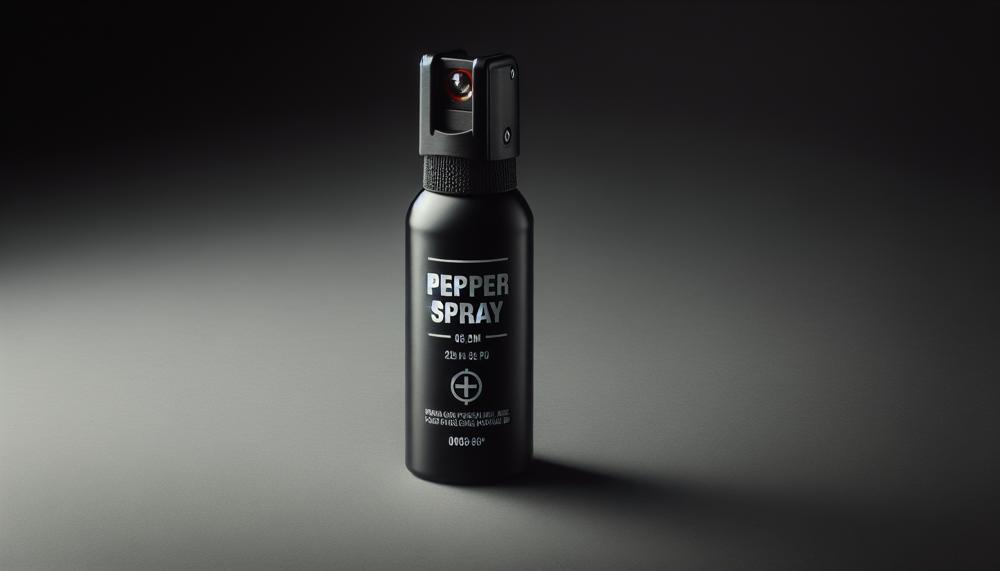
| Pain Tolerance Level | Effects When Sprayed | Possible Complications |
| High | Individuals with a high pain tolerance may exhibit milder reactions to pepper spray, such as minor discomfort and irritation. | In rare cases, individuals with a high pain tolerance may underestimate the severity of their exposure and neglect to seek proper medical attention, leading to potential complications. |
| Medium | The majority of individuals fall into this category and experience the expected level of pain and discomfort when exposed to pepper spray. | This level of tolerance usually does not result in any long-term complications, but proper medical treatment is still necessary to alleviate the immediate effects. |
| Low | Individuals with a low pain tolerance may experience intense and prolonged pain when sprayed with pepper spray, potentially leading to psychological distress. | If not treated properly, exposure to pepper spray can result in complications such as skin irritation, eye injuries, or allergic reactions. |
Understanding one’s own pain tolerance is crucial in determining how they may respond to pepper spray. It is important for individuals to take necessary precautions and use pepper spray responsibly.
Seeking medical attention if needed can help prevent any potential long-term consequences.
Psychological Effects on Attacker and Victim
The use of pepper spray can greatly affect the mental health of both the perpetrator and the victim. It can evoke intense emotions like fear, anger, guilt, and shame. These emotions can have long-lasting effects and may necessitate seeking professional assistance to overcome.
Both individuals should seek support to process their emotions and manage any potential long-term repercussions after encountering pepper spray.
Our thoughts and emotions can greatly influence our physical well-being. When an individual is subjected to pepper spray, they experience physical discomfort. They also feel a flood of overwhelming emotions that can be difficult to manage. This can result in a heightened state of fear and anxiety, leading to long-term psychological distress.
Moreover, the use of pepper spray can also trigger feelings of guilt and shame in both parties. The attacker may feel remorse for their actions. The victim may feel guilty for causing harm to others. These emotions can create a cycle of negative thoughts. This cycle can impact an individual’s self-esteem and overall mental health.
Both the attacker and the victim should seek professional help to process these emotions. Seeking therapy or counseling can assist in managing the effects of trauma and promoting healing. Additionally, talking about the incident with friends or family members can provide emotional support. It can also aid in coping with any long-term consequences.
Additionally, it is important to understand that the psychological effects of pepper spray are not only experienced immediately after an incident. They can lead to long-term mental health issues. These include post-traumatic stress disorder (PTSD) and anxiety disorders.
Seeking professional support early on can help prevent these long-term consequences.
Conclusion
In summary, pepper spray is a potent tool for self-defense. It can inflict intense pain and discomfort on an attacker.
It is crucial to understand the physical and psychological impact of pepper spray. It’s also important to know its varying strength levels. Individuals can effectively use pepper spray to defend themselves in dangerous situations. They just need to adhere to proper usage and safety guidelines.
Whether you are considering purchasing pepper spray or have already encountered its effects, always keep these safety and well-being tips in mind.
